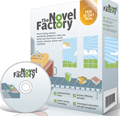Lots of people want to write a novel, but don’t know where to start. Here is a step by step  guide to writing your first novel.
guide to writing your first novel.
If you find this guide useful, you might want to check out this novel writing software, which uses exactly this method but gives tones more details and guidance, and keeps track of all your characters, locations, scenes and even submissions.
Step One – Write a Premise
First you need a single line which describes the basic plot of your novel and introduces the protagonist.
Step Two – Outline the basic plot
Next expand that single line premise into a paragraph, which gives details of the major stages of your story, including introduction to the story world, disasters and final conflict.
Step Three – Meet your characters
Next outline your major characters. Think about each one’s name, age and role in the story. You don’t need to go into too much depth at this stage.
Step Four – Short synopsis
Look back at your outline of the plot and expand it into a full page. You can add a bit more detail about twists and turns and character relationships.
Step Five – Extended Synopsis
As you might have guessed, this step involves expanding on the previous step. This section should be about four or five pages long and you should start to see the individual scenes emerge.
Step Six – Goal to decision cycle
 Make sure that each of your each of your scenes is either a ‘head’ where there its lots of action going on or a ‘tail’ where the character is reeling from the conflict in the previous scene, thinking about her options and making a decision, which will be the next scene’s goal.
Make sure that each of your each of your scenes is either a ‘head’ where there its lots of action going on or a ‘tail’ where the character is reeling from the conflict in the previous scene, thinking about her options and making a decision, which will be the next scene’s goal.
Step Seven – Character questionnaires
Complete a character questionnaire for your major characters to begin to give them some depth.
Step Eight – Develop locations
Make a list of all the locations that will appear in your story and note down some details about them, including what you can smell, see, hear, feel and taste there.
Step nine – Advanced Plotting
Now is the time to look hard at your plot and try to identify if there are any weak points, such as characters doing things without good motivations, time warps etc.
Step Ten – Character Viewpoints
For each of your major characters, go through the whole story from their point of view. Note down their reactions to the events and other characters.
Step Eleven – Scene Blocking
Write out the whole story as if you were writing stage directions.
Step Twelve – Draft One
It’s finally time for the first draft! Using your blocking as guide, write your first draft. Just steam, through, don’t be tempted to stop and edit at this stage – it’ll be a waste of time – trust me.
Step Thirteen – Theme and variations
Read through your first draft and see if any themes emerge and if you can use them to stronger effect. For example, if you write about birds a lot, could one scene have no birds, or a dead bird as a foreboding omen?
Step Fourteen – Draft Two
Rewrite and edit your first draft to tidy up the prose, remove any telling instead of showing, weave in foreshadowing and themes and generally tidy up and improve. Read more about how to write the second draft of your novel here.
Step Fifteen – Final Draft
Now it’s just a matter of editing and polishing until you’re happy with it, or until you’re simply too exhausted to hit a keyboard key – whichever comes first.


 novel
novel





